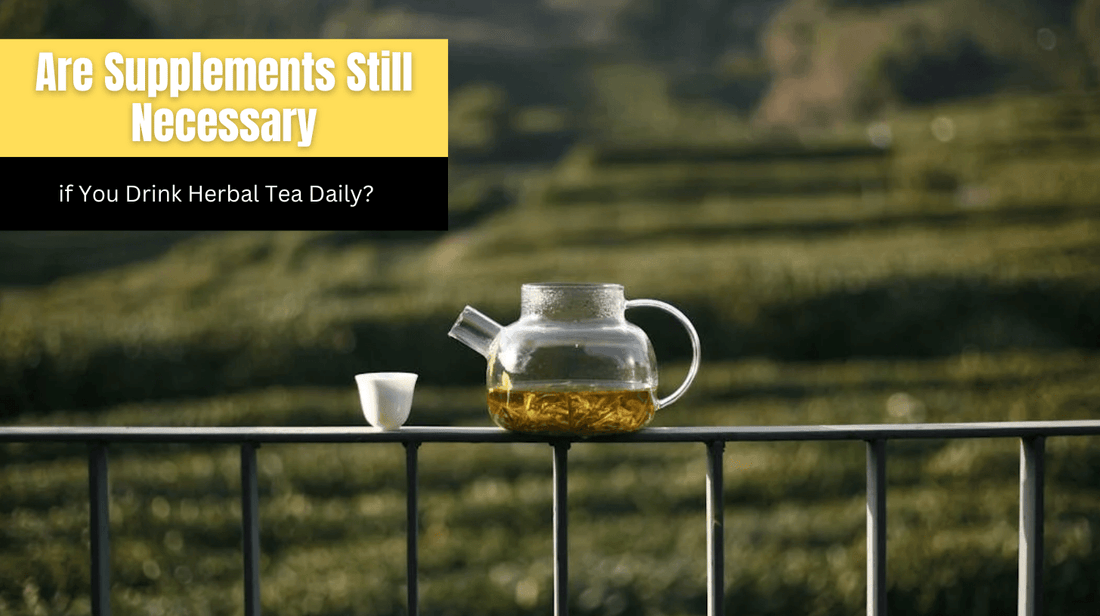
Are Supplements Still Necessary if You Drink Herbal Tea Daily?
Introduction

You’ve swapped your sugary drinks for calming chamomile, zesty ginger, and refreshing peppermint teas. You feel better, sleep better, and your digestion’s never been smoother.
But now you’re wondering:
Do I still need to take all those supplements if I drink herbal tea every day?
It’s a great question—and one many health-conscious tea lovers ask. Let’s break it down. We’ll look at what herbal teas actually offer, what they don’t, and how to know if supplements still deserve a place in your daily routine.
What Herbal Teas Give You (And Why That’s a Big Deal)
Herbal teas aren’t technically “tea” since they don’t come from the Camellia sinensis plant like green or black tea. Instead, they’re made from dried herbs, flowers, roots, seeds, or spices—and they’re packed with natural goodness.
Here’s what you can get from a cup (or two) of herbal tea:
1. Plant-Based Antioxidants
Many herbal teas contain compounds like flavonoids, tannins, and polyphenols that help protect your body from cell damage, support healthy aging, and reduce inflammation.
Best teas for antioxidants: Hibiscus, rooibos, elderberry, lemon balm
Comparable to antioxidant supplements or skin-support vitamins
2. Soothing and Healing Compounds
Different herbs have unique wellness benefits:
-
Chamomile – calms the mind and helps with sleep
-
Peppermint – eases digestion and helps with bloating
-
Ginger – reduces nausea and supports circulation
-
Turmeric – known for its strong anti-inflammatory effects
Often used in natural remedies and wellness blends
3. Immune-Boosting Properties
Herbal teas like echinacea, elderflower, and lemongrass are commonly used to give the immune system a natural lift, especially during cold and flu season.
Similar to immunity supplements like Vitamin C or zinc blends
4. Stress and Mood Support
Many herbs help with emotional wellness:
-
Lemon balm – reduces anxiety and promotes calm
-
Ashwagandha (when used in herbal blends) – helps with stress management
-
Lavender – supports relaxation and sleep
Comparable to natural mood-balancing or sleep aid supplements
What Herbal Tea Doesn’t Provide (And Why It Matters)
While herbal teas are powerful in their own way, they’re not a full nutritional replacement. Here’s what they usually don’t contain enough of:
Essential Vitamins Like:
-
Vitamin D – Crucial for bone health and immunity
-
Vitamin B12 – Needed for energy and brain health (especially important for vegans)
-
Folate – Important during pregnancy and for cell growth
Key Minerals Like:
-
Iron – Supports energy and healthy blood
-
Calcium – Keeps bones and teeth strong
-
Magnesium – Helps with muscle relaxation and sleep
So, if your diet is already low in these, or you have specific health needs, herbal tea alone won’t be enough.
Everyday Wellness: Can Herbal Tea Do the Job?
If you’re:
Eating a balanced diet with fruits, veggies, whole grains, and protein
Not dealing with any known nutrient deficiencies
Using herbal tea as a daily wellness habit (not a cure-all)
Then yes—herbal tea can go a long way in helping you feel your best.
It supports digestion, sleep, immunity, mood, and hydration in a gentle, natural way. And for many people, this daily support is all they need to maintain a healthy lifestyle.
When Supplements Still Matter
Even if you drink herbal tea regularly, here are some situations where supplements are still important:
- You live in low-sunlight areas – You may need Vitamin D
- You're vegetarian or vegan – You may lack B12 or iron
- You're pregnant or nursing – You need higher levels of folate and calcium
- You’re an athlete or under physical stress – Extra magnesium or protein may
- You have a restricted diet or food sensitivities
In these cases, supplements act like a safety net—filling in any nutritional gaps that even a healthy tea habit can’t cover.
Herbal Tea + Supplements = A Smart Combo
You don’t have to choose one or the other.
Here’s the best approach:
Let herbal tea be your everyday natural support. Use supplements only when your body needs a little extra help.
This way, you get the best of both:
-
Herbal tea for gentle, plant-powered daily support
-
Supplements for precise nutrients your body might be missing
Tea Tips: How to Get the Most Out of Herbal Teas
-
Drink 2–4 cups daily to enjoy steady benefits
-
Try single-ingredient teas (like peppermint or ginger) for targeted support
-
Explore blends made for sleep, digestion, or immunity
-
Always choose high-quality, organic herbs to avoid pesticides or artificial flavors
Final Thoughts: Can Herbal Tea Replace Supplements?
Herbal teas are an amazing, natural way to care for your body—especially if you enjoy them regularly and eat a well-rounded diet.
They can:
- Support immunity
- Calm the mind
- Aid digestion
- Help you relax and sleep
- Provide antioxidants
But they won’t give you everything. So if you have specific health needs or your diet is lacking in key nutrients, it’s a good idea to keep supplements in your toolkit.
Call to Action
Looking for herbal teas that support your daily wellness?
Explore our curated blends—crafted with pure, natural ingredients to help you feel your best.
Browse Herbal Wellness Teas
FAQs
Q1: Can I stop taking vitamins if I drink herbal tea every day?
Not always. Herbal tea supports your health, but it doesn’t usually contain essential vitamins like D, B12, or iron.
Q2: Are there herbal teas that help with immunity?
Yes! Teas with echinacea, elderberry, lemon balm, or ginger are great for immune support.
Q3: Can herbal tea replace sleep aids or stress supplements?
For many people, yes. Herbs like chamomile, lavender, and lemon balm can promote calm, reduce anxiety, and help with sleep—without the need for pills.
Q4: Is it safe to drink herbal tea every day?
Absolutely! Most herbal teas are safe for daily use. Just make sure to read labels and talk to your doctor if you’re pregnant, nursing, or on medication.










